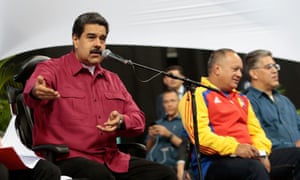
Venezuela’s president has accused the company that provides the technological platform for the country’s voting system of bowing to US pressure after it said the official turnout figure in Sunday’s vote had been manipulated by at least a million votes.
Nicolás Maduro stood by the official count of more than 8m votes and said an additional 2 million people would have voted if they had not been blocked by opposition protesters. “That stupid guy, the president of Smartmatic, pressured to the neck by the gringos and the Brits, said there were 7.5 million [voters],” Maduro said in televised remarks. “I think there were 10 million Venezuelans who went out.”
Antonio Mugica, the chief executive of London-based Smartmatic, had said on Wednesday that results recorded by the company’s systems show “without any doubt” that the official turnout figure was tampered with.
Maduro provided no evidence to support his claim, but his remarks were received with resounding applause from a meeting of about 500 people elected to the assembly on Sunday.
The body, made up entirely of the ruling Socialist party and its political allies, will have the ability to dissolve state institutions and rewrite the constitution. Maduro has also vowed he will use it to target his opponents.
He called the vote in May after weeks of protests fuelled by widespread anger over food shortages, triple-digit inflation and high crime.
As many as 40 countries have also said they would not recognise the new assembly, which critics say is a thinly veiled attempt by Maduro to consolidate power. Venezuela’s opposition has announced plans to block the assembly’s inauguration, which Maduro put back a day to Friday, and called for mass protests “against the installation of the constituent fraud”.
Mugica said on Wednesday that Smartmatic detected the overstated turnout because of Venezuela’s automated election system. “We estimate the difference between the actual participation and the one announced by authorities is at least 1m votes,” he said. “We know, without any doubt, that the turnout of the recent election for a national constituent assembly was manipulated.”
The turnout figure had previously been contested. The electoral council president, Tibisay Lucena, had put it at 41.53%, or 8,089,320 people, but the opposition put the number at between 2 million and 3 million. Independent analysis had suggested about 3.5m votes.
Lucena dismissed Mugica’s allegations, calling it an “opinion” of a company that played only a secondary role in the election and had no access to complete data.
In a rare display of criticism from a veteran Chávista, Andrés Izarra, a former information minister under Maduro’s predecessor, Hugo Chávez, tweeted: “Company which supports Venezuelan electoral system confirms that election was manipulated by at least a million votes.”
His tweet quickly went viral. In a follow-up tweet, Izarra said he recognised there were “doubts that must be cleared up about the results of Sunday’s election” but warned the opposition that he had not become one of them. “Squallid [sic] ones, don’t count on me EVER,” he tweeted.
Julio Borges, the leader of the opposition-held parliament, said voter fraud was “the most serious crime that can be committed against democracy”.
Meanwhile international pressure mounted on Maduro as his country and government became increasingly isolated, after two top political opponents under house arrest were dragged from their homes in midnight raids.
Federica Mogherini, the EU’s high representative for foreign affairs, said in a statement that the union would not recognise the new constituent assembly due to “concerns over its effective representativeness and legitimacy”. She failed, however, to act on calls from the European parliament’s president, Antonio Tajani, and Spanish prime minister, Mariano Rajoy, for targeted sanctions on anyone linked to Maduro’s government; but the bloc warned that it was ready to act if there was any further dilution of the country’s democratic institutions.
Maduro and his closest allies have said they will use the assembly to jail key opposition leaders, remove the country’s outspoken chief prosecutor from her post and strip opposition legislators of their constitutional immunity.
“The constituent assembly is the change so that this country can regain order. Anarchy is over, here,” said Cilia Flores, Maduro’s wife, on receiving her accreditation as a member of the assembly. “Justice will come starting tomorrow,” she said.
Borges said on Wednesday that MPs were asking the nation’s chief prosecutor to investigate election commission members for potential crimes.
Luisa Ortega Díaz, the nation’s top law enforcement figure and former government loyalist, who has fallen out with Maduro, told CNN late on Wednesday that her office would investigate.

No comments:
Post a Comment